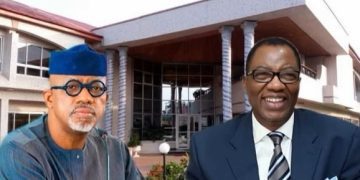The Founder and overseer of the Citadel Global Community Church (CGCC), Pastor Tunde Bakare on Sunday raised the alarm that Nigeria is careering towards tyranny on the watch of President Bola Ahmed Tinubu, also warned that the country is too delicate for the President’s brand of politics.
Bakare, one of the 2023 presidential aspirants that jostled for the All Progressives Congress (APC) presidential ticket which the incumbent President secured at the Eagle Square Abuja in 2022 by defeating other contestants, alleged that Tinubu was weakening established institutions and subjugating the people to walk his path.
The Lagos fiery preacher who over two years ago predicted that he would succeed ex – president Muhammadu Buhari as the 16th President of Nigeria, urged President Tinubu to stop “playing God,”even as he warned that his administration was steering the nation off course.
Bakare made this known during his state of the nation broadcast on Sunday in Lagos shortly after the Easter Sunday service.
The former Vice-Presidential candidate on the platform of the defunct Congress for Progressive Change (CPC), lamented that the legislature, a bastion of democracy has become ‘spineless and collapsing’ under the watch of the President.
He said, ‘’To the President of the Federal Republic of Nigeria, under whose brand of politics the institution of legislative oversight is collapsing and our democracy is faced with an existential threat, I say: Mr. President, Nigeria is too delicate for this kind of politics.
‘’If this state capture was what you meant by ‘emi lo kan,’ it is an anti-climax that can only be counterproductive in the end. I urge you, Mr. President, to think deeply and reflect on these words: No man is wise enough nor good enough to be trusted with unlimited power. Please, stop playing God!’’
Bakare noted that the given the nation’s current precarious trajectory, a Joseph – kind of leadership was needed to redeem her from what he likened to motor park brand of politics.
He said, “Fellow citizens, at the centre of this political banditry, is the motor park brand of politics nurtured by the old brigade politicians and, in recent times, by President Bola Tinubu.
“Those responsible for steering the course of our nation lack the humility and character this moment demands…What we have seen since the beginning of the year is a descent into tyranny and the brazen abuse of power.”
He questioned the rationale behind the suspension of Senator Natasha Akpoti – Uduaghan for demanding accountability and transparency from the Senate President, Senator Godswill Akpabio.
He also accused President Tinubu of turning the National Assembly to “a haven for legislative rascality” and the 48th member of his cabinet.
“Through its actions and inactions, the National Assembly has, in effect, become the 48th member of the President’s cabinet, while a cabinet minister has, more or less, become a third-term state governor in Rivers State, pampered by the indulgences of the President.
“Mr. President, it is through your influence that the Nigerian National Assembly has become a haven for legislative rascality. Mr. President, it is under your watch that the National Assembly has become an extension of the executive, grossly violating the principles of separation of powers and rubber-stamping the whims and caprices of your office, all while singing the international anthem of sycophants: ‘On your mandate, we shall stand.’
“Mr. President, thanks to your political machinations, Nigeria is now bedevilled by a captured National Assembly, the most ineffective in its checks-and-balances role since the start of the Fourth Republic. This National Assembly, the Tenth, has by its unconstitutional endorsement of the President’s abuse of powers proven to be the most spineless in our recent history,” he argued.
Zeroing in on the economic policies of the President Tinubu’s led government he said, ‘’Whether we like it or not, this administration holds the reins of our economy, and we cannot allow them to flush it down the drain.”
Referencing the fuel subsidy removal and exchange rate regimes of the current administration, Bakare said, “Within a year and a half of this administration, the implementation of the otherwise audacious economic policies triggered an avalanche of economic hardships for the Nigerian people. It led to excruciating food inflation, with over a million additional Nigerians thrown into severe food insecurity.”
He noted that this led to over 430 per cent increase in fuel price as of October 2024 when at the same time, Nigeria experienced the highest-ever rate of currency depreciation, and the lowest Foreign Direct Investment record going by data traced back to 2013 as multinationals began to exit the country.
He added that Nigeria has one of the world’s highest misery indexes, with many Nigerians experiencing a cost of living crisis and weak purchasing power due to rising inflation.
Bakare noted that, “While it is not in dispute that difficult economic reforms come with costs and are usually associated with periods of hardship, four essentials must be taken into consideration when driving reforms.
“The stampede deaths in several cities at the end of 2024 were the most horrific climax to the economic hardships experienced by Nigerians.
“The heartbreaking reports of parents throwing their children over a fence in Ibadan to ensure access to charity food distribution, leading to the deaths of over 35 children, were tragically almost reminiscent of the biblical famine in Samaria during which parents resorted to eating their children for survival,” the Pastor affirmed.
“fuelling imported inflation and triggering the worst cost of living crisis in a generation…These measures have pushed tens of millions of already impoverished people deeper into misery.”
Bakare argued that empathy will lead leaders to understanding and sharing in the plight of the people, methodology will aid a systematic deployment of tools to cushion the biting effects of reforms; transparency will mandates governments to act openly and to carry the citizens along at every major decision point in the reform journey; while responsibility on the part of leaders make them to take the lead in bearing the difficult and painful impacts of reforms.
On the growing challenges of insecurity, the cleric recommended the reinstatement of national security federalism by activating constitutional procedures for multilevel policing, to include local, state and zonal policing systems.
“Against this backdrop, we must redesign our security architecture by facilitating the formation of Zonal Security Councils chaired by a governor from the respective zone on a rotating basis.
‘’Such Zonal Security Councils, which will be formed by state and local policing systems within respective zones, must be managed by nonpartisan security experts while the Chairperson at each point in time will represent the zone at the National Security Council,‘’ he said.
Bakare urged Tinubu to sack under‑performing aides and appoint persons of impeccable integrity…reputed for transparency and accountability.
He listed five-point plan, suggestions to navigate through this troubling time in the country, which includes creating a Consolidated Value Investment and Development Fund to mobilise diaspora capital and repatriated loot; launching a Reform Amelioration Incentive Scheme to cushion the poor; restructuring security into local, state, and zonal forces; empowering a nonpartisan Directorate of National Intelligence; and “heal and unite the nation” through justice and reconciliation.
“No man is wise enough nor good enough to be trusted with unlimited power,” he told the President.
Bakare added, “Please, stop playing God! Nigeria is too delicate for this kind of politics.”
However, Bakare admitted that Tinubu had recorded some positive developments for the nation, citing the increase in Nigeria’s foreign reserves from $35bn in May 2023 to $40bn by November 2024 as an example. He warned that these achievements should not take precedent over the broader challenges facing the country.








































